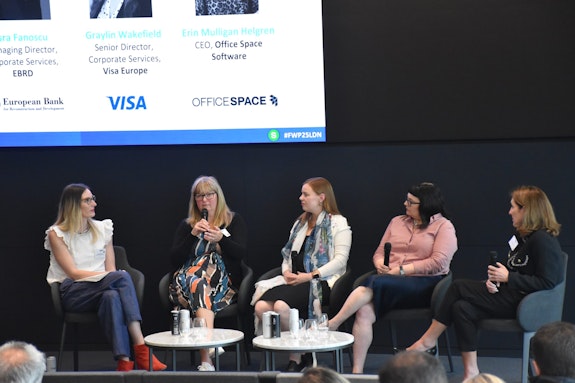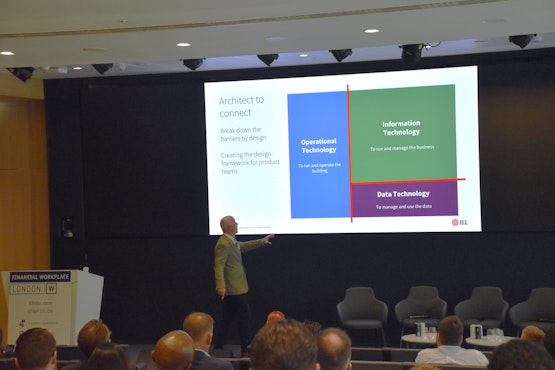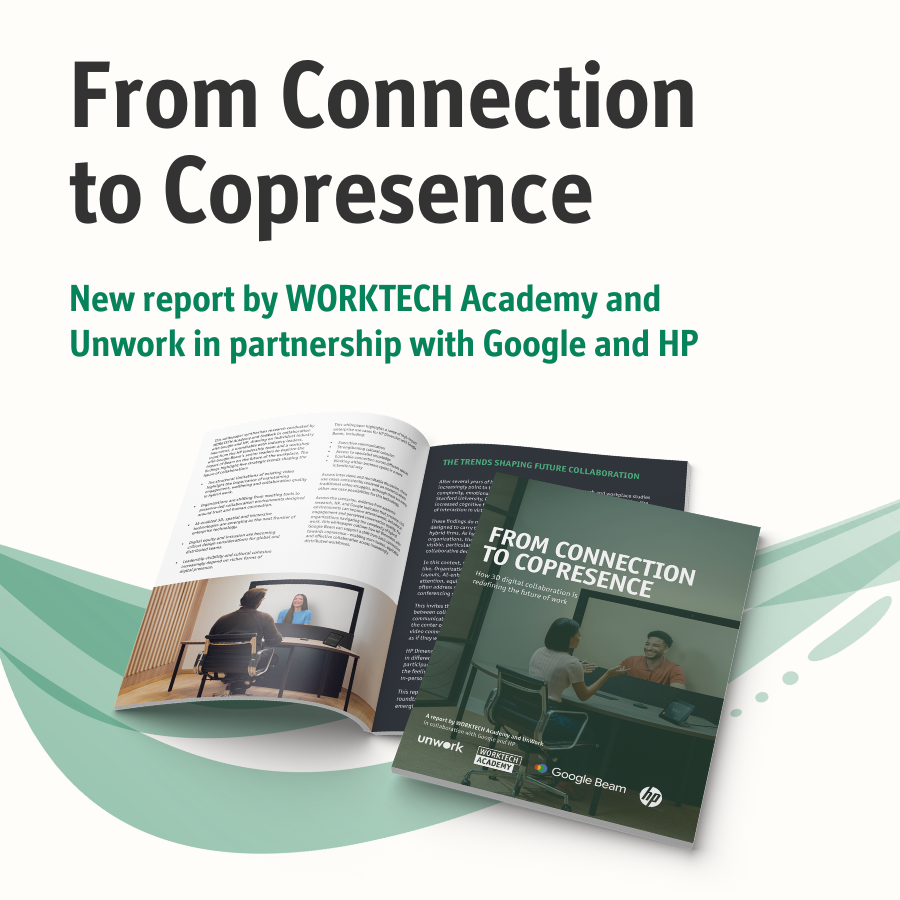Beyond the bottom line: financial workplaces shift towards meaningful impact
From tech debt to human credit, WORKTECH's Financial Workplace conference in London revealed how financial firms should rethink their strategies to lead with culture, data, experience
The financial workplace is in a period of transition. As old models buckle under the weight of new pressures such as shrinking real estate footprints, rising return-to-office demands, and scattered digital systems, fresh thinking is beginning to take hold.
At WORKTECH’s latest Financial Workplace conference, hosted at M&G’s London HQ, industry professionals across finance, real estate, technology, and design joined the discourse around how to bring people back to the office, and why they’d want to come in the first place. Throughout the event is became increasingly clear that financial firms are embracing a new formula – blending hospitality with hybrid, data with design, and culture with measurable value.
The experience layer
Experience has become a key differentiator of the workplace – and this is particularly evident across the financial industry. Dr Imogen Privett of Unwork described the office as a ‘magnetic hub’ – a site of serendipity, connection and purpose. Instead of commanding presence into the office, firms are curating experiences.
And when it comes to elevating the workplace experience, it seems that New York is the place to be. From JPMorgan’s new 270 Park Avenue HQ to Blackrock’s Hudson Yards office and One Vanderbilt’s commitment to high-end amenity, the city is sending a clear message to its office workers about the experiences they can expect if they do make the effort to come into the office.
‘The office is becoming the offsite.’ – Dr Imogen Privett
Although New York is storming ahead, there are notable workplaces outside the city – and the financial industry – that go far beyond the traditional amenity offerings of a corporate gym and a free coffee. Lego’s global headquarters in Billund is a world-class example of how to attract employees into the out-of-town campus. It’s purpose-built ‘People House’ offers an array of amenities which include a hotel, basketball court, restaurants, wellness spaces, and family areas. Lego is leveraging amenities to strengthen the business by promoting stronger collaboration between people. In this new era, even food becomes strategy. Pet kindergartens, dry cleaning, and in-office wine shops aren’t perks – they’re participation incentives.
How finance is learning to listen to its spaces
For financial firms, the challenge isn’t collecting workplace data, it’s knowing what to do with it. Martin Shaw, Head of CRE Operations at M&G summed up the sentiment: ‘We didn’t want to be the company with loads of sensors and no ‘so what?’’
Across the sector, firms are measuring occupancy, movement, temperature, and even how often furniture is rearranged. This amounts to a huge accumulation of data, not all of it actionable. Rachel Caldicott, Head of Strategy, Planning and Workplace Solutions at M&G, warned that teams must invest time in knowing what to ignore. ‘Start with the outcome,’ she urged. ‘Understand what data points are just interesting – and which ones are actionable.’
Culture over compliance
For many financial firms, the RTO conversation has shifted from policy to purpose. Despite media headlines pushing the narrative that financial firms are back in the office five days a week, many firms are staying strong in their hybrid stance. But this have proven complex – and increasingly policies are being put in place to offer guardrails to teams around different work models.
‘The reason to be brought back to the office should be the culture, not the building being empty.’ – Catherine Yates, NatWest
Esra Fanoscu of EBRD explained that the focus has moved beyond return-to-office targets or tracking presence. Instead, it’s about making the workplace feel meaningful and worth coming into. For Catherine Yates of NatWest, culture – not capacity – is the new magnet. ‘If leaders are in, people often come in,’ she said, underscoring the power of leadership presence over policy.

Catherine Yates on the Expert Panel at Financial Workplace London: Reimaging the Financial Workplace in the Hybrid Era
Leaders from Visa Europe and OfficeSpace Software echoed this. Erin Mulligan Helgren, CEO of OfficeSpace framed hybrid work not as a lifestyle preference, but a practical solution to support diverse working styles. The goal isn’t flexibility for its own sake – it’s designing productive patterns, wherever they take place.
Meanwhile, metrics for workplace and business success are evolving. Firms are triangulating attendance data with qualitative insights including focus groups, data on booking behaviours, and collaboration patterns. Tracking behaviour isn’t about surveillance, either. As Helgren noted, ‘It’s not to punish, but to understand.’
Tackling tech dept
Tech debt in corporate real estate isn’t theoretical – it’s operationally expensive. Andy Targell of JLL Technologies laid out the scale of the issue: ‘We put stuff in and we move to the next thing,’ he said, highlighting that it’s a bit like adding random features to a house on wobbly foundations.
According to JLL, 35–45% of CRE tech spend is inefficient. Systems overlap, data stays siloed, and duplication adds complexity at every level. This results in money down the drain and structural challenges in the future.
‘How can AI magically fix a building if we don’t know how we’re going to build the building?’ – Andy Targell, JLL Technologies
To move forward, Targell called for a shift in mindset: digital systems should be designed with the same intent and rigour as physical space. ‘We need IT architects to design this infrastructure like we do a building.’ That means creating shared capability models that align tech, real estate, and operations.

Andy Targell, on ‘Cut Down on CRE Tech Debt Using Enterprise Agility’ at Financial Workplace London
Towards unified workplace strategy
Financial services firms are evolving their focus from merely cutting costs to understanding workplace value in a more integrated way. Phil Davitt of Eptura introduced the concept of a ‘unified ROI’ – bringing real estate, technology, and people strategies together into a single, measurable framework.
One major challenge highlighted by Eptura’s 2025 Workplace Index is balancing occupancy throughout the workweek. Even as a third of companies plan to increase in-office days, many have downsized their portfolios, creating tension between available space and demand.
This means making every square metre pull its weight – optimising space utilisation not just for efficiency but for employee experience. However, friction remains in areas like visitor management, where analogue processes persist, creating a mismatch between brand promise and experience – especially in trust-sensitive sectors like finance.
Crucially, advancing operational clarity requires centralised, reliable data. Artificial intelligence and smart tools depend on clean, unified information streams to function effectively. As a result, many organisations are investing in consolidated platforms that break down silos, reducing friction and enabling smarter workplace ecosystems.
Ultimately, success in the financial workplace increasingly hinges on balancing cost efficiency with a seamless, engaging employee experience.
Financial Workplace25 revealed a sector in transition – where legacy models no longer hold and new approaches are essential. The future financial workplace isn’t about returning to what was, but building what works – spaces designed with purpose, powered by clarity, and grounded in culture.








